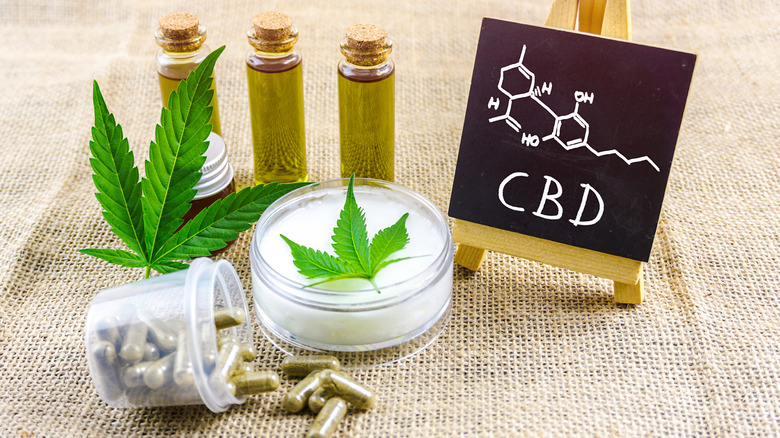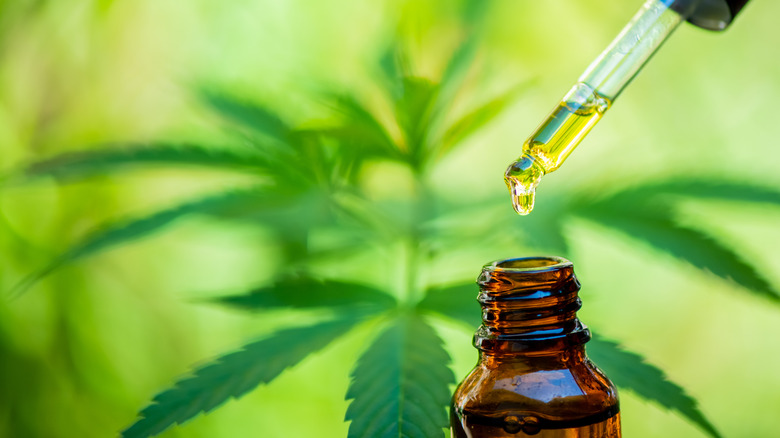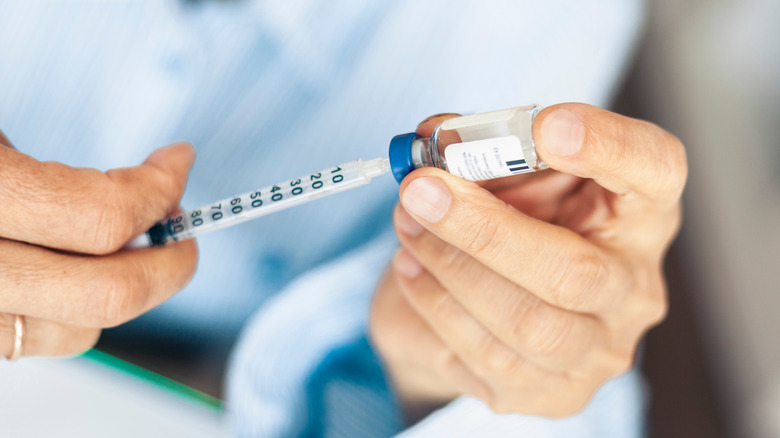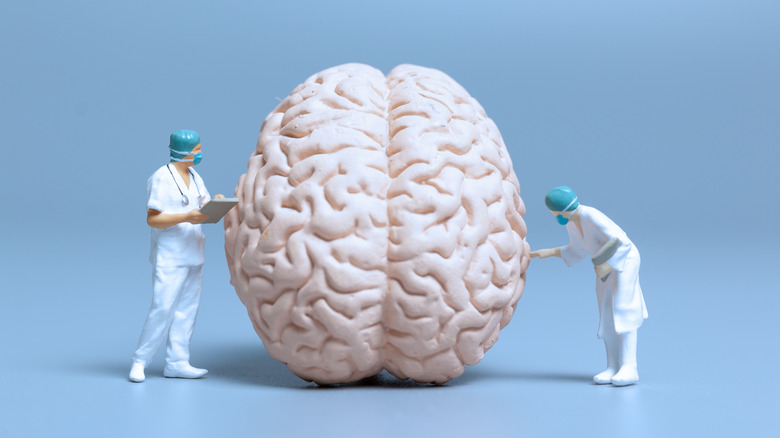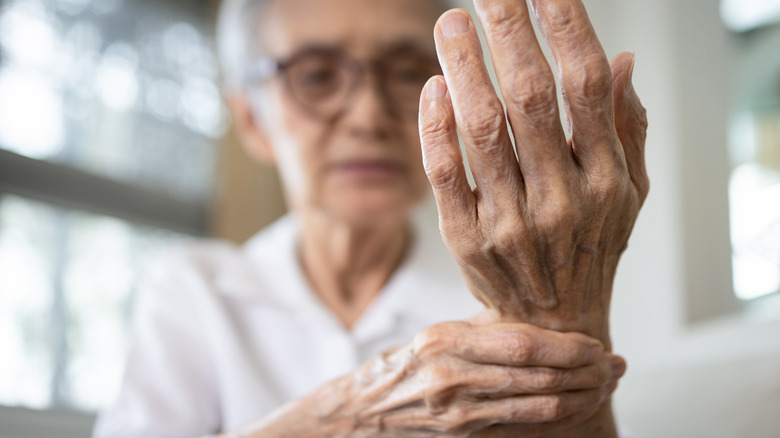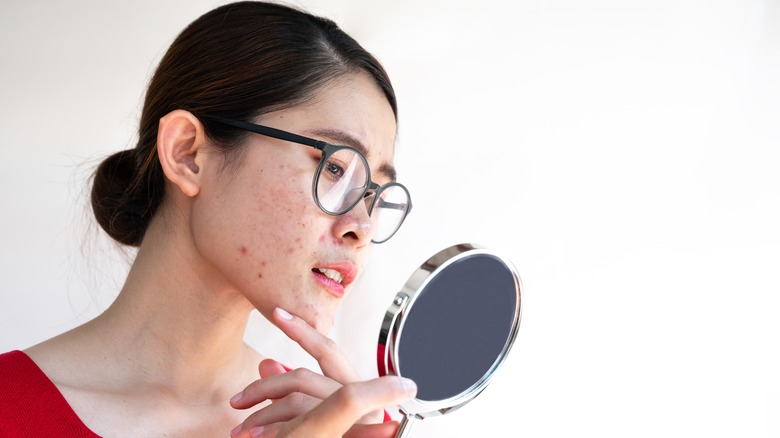14 Things You Didn't Know You Could Use CBD For
Cannabidiol, better known as CBD, has been touted as a "miracle drug" in recent years. After the Farm Bill passed in 2018 making selling CBD legal, the market was almost instantly flooded with products containing the compound, but what is it, really?
According to GoodRx Health, CBD comes from the cannabis Sativa plant, better known as marijuana or hemp. This plant is versatile -– yes, it is the same plant that produces Tetrahydrocannabinol (THC) but more than 400 other chemicals can be found in this leafy green. Thanks to THC, which many people smoke or ingest to get high, CBD has a bit of controversy surrounding it. However, this compound does not have psychological effects, instead, it provides many medicinal properties and could help people to manage common conditions like anxiety and pain.
Multiple studies are being conducted to investigate CBD's seemingly endless amount of healing properties. In just about all cases more study is needed, but early results give reason to be hopeful. From its potential to help treat mental health disorders to possibly being a future treatment for certain types of cancer, here are 14 things you didn't know you could use CBD for.
It may help alleviate depression
Major Depression is the most common mental illness in the U.S, per the National Institute of Mental Health. It's something millions of people have to deal with daily, and it can prove a real challenge sometimes. It might seem unlikely that something as minuscule as CBD can be the end of that excruciating all-time-low, but don't knock it till you try it.
Various studies have been conducted to explore the effect CBD can have on depression, and the results look incredibly promising. In an article Doctor of Psychology, Emily Guarnotta wrote for GoodRx Health, she explains that there is indeed proof that CBD can aid in treating depression because of its ability to change serotonin levels. Several studies have been conducted in an attempt to confirm these findings, including a 2018 study published in the Journal of Affective Disorders (via Science Direct) that found that using medical cannabis high in CBD and low in THC brought about a 50% improvement in depression symptoms.
Using CBD to help treat depression might be worth a shot. According to Medical News Today, CBD might be the ideal solution for those who suffer from the side effects of traditional drugs. It could potentially pack the same punch, acting the same way an antidepressant would, according to a 2014 study review published by the National Library of Medicine.
CBD could help epilepsy patients
Studies looking at the effect of CBD on epilepsy are still very new, but the results are encouraging. In fact, the Food and Drug Administration approved a CBD drug, Epidiolex, for use in patients who suffer from rarer forms of epilepsy like Lennox-Gastaut syndrome and Dravet syndrome. These conditions are usually challenging to treat with traditional medication. Patients as young as 2 years old can use the drug if they suffer from either one of these conditions.
As for how CBD works to alleviate epilepsy symptoms, doctors are still uncertain, according to Healthline. Medical professionals suspect that CBD's efficacy in these cases is because of its ability to affect the receptors in the body that are responsible for the neuron excitability that causes seizures. These findings are still based on animal studies and more research is required.
It is not yet clear whether CBD is as effective at treating other forms of epilepsy, but some studies show CBD could potentially aid existing epilepsy medication in alleviating symptoms. Yet as CBC is a relatively new compound on the market, more research is needed to determine the safety and efficacy of CBD in these cases.
It may stop PTSD in its tracks
Many treatments exist to help those suffering from post-traumatic stress disorder (PTSD). Yet for those looking for natural treatments, studies conducted on the efficacy of CBD for treating this condition are promising, according to Healthline.
A review article published in Frontiers in Neuroscience has looked at the effect of CBD on PTSD and found that it can help alleviate symptoms. The good news is that using CBD on its own or along with other PTSD treatments both seem to be effective.
What's even more interesting is that CBD appears to be able to help prevent severe PTSD if it is taken right after experiencing a traumatic event. This is because of its apparent ability to affect the brain and prevent it from creating the traumatic memories that later lead to PTSD.
As with most CBD-related research, doctors are still scratching their heads as to why it works as a treatment for PTSD. According to the aforementioned study, it is likely because CBD has the ability to affect certain parts of the brain, most notably the hippocampus and amygdala. The latter is usually overactive in patients who suffer from PTSD, which exacerbates symptoms, but its activity can be stunted by the hippocampus. CBD stimulates the hippocampus, causing it to grow, resulting in a less active amygdala, thus the decrease in PTSD symptoms.
CDB can quell anxiety
Studies have also shown promising results when it comes to using CBD to help alleviate various anxiety disorders. This is because, according to a 2015 study review published by the NLM, CBD has the ability to interact with the brain and stimulate receptors that are responsible for controlling anxiety and fear. A study published in the Neuropsychopharmacology Journal that looked at the effect CBD has on social anxiety disorders supports these findings. Researchers administered CBD to participants right before they had to do a public speaking simulation and found that it reduced their anxiety, while those who were given a placebo showed signs of anxiousness.
Interestingly, the effect CBD has on the brain can actually be seen on a scan, according to a review published in Frontiers in Pharmacology. This reiterates CBD's ability to physically affect the brain to ease anxiety.
Of course, as with most of these studies, scientists are still learning, but a 2020 review of eight studies found proof to support claims that CBD is successful at treating various anxiety disorders. Now, researchers are trying to figure out the ideal dosage, which could take some time.
Chronic pain can be diminished by CBD
Some studies indicate that CBD might be helpful for chronic pain. While patients need to speak with their doctor before taking CBD alongside any other pain medication, a study published in the National Library of Medicine found proof that CBD has powerful medicinal properties –- it is anti-inflammatory and can act in the same way pain medication would.
What's even more exciting is that animal studies discovered CBD's potential to replace highly-addictive opioids. Results showed that CBD can act as a very effective pain treatment without the dreaded side effects that usually accompany strong pain medication. These studies still need to be conducted on humans to confirm CBD's effectiveness in these cases, but the results so far are encouraging.
Some countries have approved the use of CBD for painful conditions based on existing research. The United Kingdom approved it to help treat multiple sclerosis while Canada has approved its use for cancer-related pain, Forbes reports. The Food and Drug Administration has not approved CBD for painful conditions as of yet, per Medical News Today, but if you'd like to try CBD as a treatment for chronic pain, speak to your doctor about how you can proceed with treatment.
CBD can lessen diabetic complications
Diabetes is a lifelong condition that needs to be monitored and managed carefully. Several medications exist to help treat diabetes and its complications, and CBD might be included as a treatment in the future. For now, studies are being conducted to vet its efficacy. Most of the studies conducted so far have been on animals. Tony Yang, MPH, told Everyday Health that larger, human studies are needed to truly understand whether CBD could be an effective treatment or not. Some of the animal studies have been promising so far –- researchers discovered that CBD actually helped treat diabetes in mice. These findings definitely warrant some further research.
One human study found that CBD could actually protect cells from the negative effects of high glucose levels (via The National Library of Medicine). To researchers, it is clear that CBD could have a positive impact on the complications associated with diabetes. In another human study conducted with 13 type 2 diabetes patients, researchers discovered that, after taking CBD, there was a significant decline in patients' insulin resistance levels while the hormone that regulates insulin release from food increased, indicating that CBD could potentially serve as a natural remedy for diabetes in the future (via the NLM).
CBD may help with Parkinson's and Alzheimer's symptoms
Dementia-related illnesses like Parkinson's disease and Alzheimer's can be difficult to treat, but CBD might be a treatment option in the future. Research conducted through California's Salk Institute discovered that CBD could help treat Alzheimer's. Researchers discovered that the brain cells' connections increased after using CBD, while also showing signs of decreased dementia.
A study published by Frontiers in Pharmacology supported the findings of the aforementioned study. It found that CBD can help to develop and generate new brain cells, which could improve memory and other brain functions that are usually negatively affected by diseases like Alzheimer's. This is likely due to CBD's neuroprotective properties: It is anti-inflammatory and serves as an antioxidant. The study suggests that CBD could serve as a potential treatment for Alzheimer's disease in the future, but more human studies need to be conducted to further investigate its effect on the disease.
The same reasons CBD could potentially help prevent and to some extent treat Alzheimer's disease are the same reasons researchers believe it could also help patients suffering from Parkinson's disease. A study published in the Journal of Psychopharmacology discovered that CBD seems to be quite effective at treating the psychotic symptoms associated with Parkinson's disease. Another study found that taking an FDA-approved CBD drug for epilepsy, Epidiolex, brought about a noticeable improvement in Parkinson's patients' symptoms, most notably those affecting motor function (via The National Library of Medicine.)
Researchers are hopeful CBD will treat arthritis
According to Harvard Health, arthritis is a tricky condition to treat -– what works for one patient might not work for another. This is because there exist more than 100 different types of Arthritis, each of which must be approached accordingly when it comes to deciding on treatment. So, can CBD make a dent in this formidable disease? Well, it might depend on your unique body and what type of arthritis you have.
Three studies published by the National Library of Medicine looked at CBD's possible role in easing the symptoms of arthritis. In 2017 one study found that CBD could aid in easing joint pain caused by osteoarthritis, while another study published in 2016 discovered that applying CBD topically could ease inflammation and pain associated with the condition. CBD interacts with the body's pain receptors, influencing how these receptors respond when they are triggered, a 2011 study found. That is why CBD might be an effective treatment. Still, once again, this has only been observed in rats and still needs to be tested on humans.
There isn't an approved CBD medication available for arthritis yet, but a review article published in 2016 by Scielo Brazil found that a mouth spray called Sativex may help ease symptoms of arthritis. It is important to note, however, that this medication contains both CBD and THC. Patients who want to try CBD as a potential treatment need to discuss it with their doctor before taking it.
Cancer-related symptoms are improved with CBD
Many cancer patients experience pretty terrible side effects when they undergo treatments like chemotherapy and radiation. Sometimes, prescribed medication doesn't do much to alleviate these symptoms, but some studies have shown some promising results when it comes to CBD's ability to treat these side effects.
A controlled trial study published by the National Library of Medicine included 177 patients that experienced cancer-related pain that wasn't alleviated by traditional treatment and found that CBD combined with THC brought about noticeable relief. Patients who were only given THC did not experience the same improvement as those who received CBD as well.
Thanks to similar studies that have been conducted, synthetic THC drugs like Dronabinol and Nabilone have been approved to treat cancer-related symptoms like pain and nausea in the United States, according to the American Cancer Society.
There is also some evidence that CBD might be able to treat certain cancers. A 2019 study review (via the NLM) focusing on pancreatic cancer found that CBD was able to decelerate tumor growth and even kill tumor cells. A 2010 study (via Springer) showed that CBD could be a potential treatment for metastatic breast cancer as well. Researchers discovered that CBD managed to keep the cancer cells from multiplying and further invading the body. Another study revealed that CBD might do the same for colon cancer, preventing the malignant cells from spreading (via Science Direct).
CBD may even contribute to better heart health
Besides possibly treating all the aforementioned illnesses, CBD could help to keep your heart healthy. A small study published by the American Society for Clinical Investigation (via the National Library of Medicine) discovered that CBD could potentially help lower blood pressure in healthy individuals and help keep it that way even when they are exposed to stressors. The British Journal of Pharmacology also published a slightly larger study that found that CBD can help improve blood flow (via the NLM) Both these studies included healthy men.
Other animal studies show that CBD has the potential to aid in heart health and could even help prevent the serious side effects stroke patients experience, but human studies are lacking. The results are promising, however. A study review published by MDPI conducted in 2010 showed that CBD has the potential to protect the brain during a stroke and help it recover afterward. A2017 study by Frontiers in Pharmacology discovered that cerebral blood flow increases during a stroke when CBD is present in the subject's system. Still, patients who experience any issues relating to heart health need to speak to their doctor before trying CBD since human studies are still very limited.
Better sleep is reported by some CBD users
If you aren't getting enough sleep, CBD might help you do just that. If you suffer from a sleep disorder, there is hope. Studies found CBD could be effective at treating conditions like insomnia, but of course, more research is needed to confirm this (via the NLM).
Two 2019 studies, both of which were published in the National Library of Medicine, made some interesting discoveries. The first found that CBD can affect cortisol levels, lowering them much like a sedative would, which can help promote sleep. The other involving 72 subjects supported these findings. After taking 25 milligrams of CBD a day for a month, a whopping 66.7% of subjects said they noticed an improvement in their sleep while 79.2% found that their anxiety levels declined.
Surprisingly, CBD could also aid in wakefulness, according to a 2014 study review. These findings are based on both animal and human studies. As for why CBD is able to both promote sleep and wakefulness — it's not yet clear.
Chronic gut issues are another area that researchers are hoping CBD can help
While research on CBD's potential effect on gut issues is still pretty scarce, studies are encouraging. According to Cannabis and Cannabinoid Research, some findings show that, because our bodies have several cannabinoid receptors (some of which are located in the stomach) it is possible that CBD can have a positive effect on gut issues like IBD and IBS. CBD has anti-inflammatory properties, which another study published by the NLM found could help treat inflammation in the GI tract. According to the International Journal of Molecular Sciences, there is a chance that taking CBD could result in therapeutic benefits for those suffering from IBS and similar conditions, but more studies are needed to confirm these findings.
As for conditions like Chrons disease, a 2018 study review (via The NML) found that it appears CBD containing traces of THC can help manage the symptoms of the condition and improve overall life quality, but more studies need to be conducted. If you suffer from any of these conditions, speak to your doctor before using CBD.
It might help to treat acne
We all want a miracle treatment that will zap acne for good and give us glowing skin for the rest of our lives. Sadly, such a treatment doesn't exist – yet. However, CBD might just be the miracle drug we're looking for.
As with all other things CBD can help treat, more research is needed on its efficacy when it comes to treating acne, but a very promising study published in the Journal of Clinical Investigation got our hopes up. The study used human skin samples to test CBD's effect on oil-producing glands. The findings are exciting: It appears that CBD's anti-inflammatory properties can calm down those pesky oil-producing glands and even help prevent oil production. This led researchers to conclude that CBD might very well be a future treatment for acne. Somebody hand us some CBD facial cream now!
As for scarring caused by acne, CBD could be just as effective. Even though there are no studies on the effect CBD has on acne scarring specifically, there is a study published by Clinical Terapeutica that looked at its effect on scarring caused by atopic dermatitis and psoriasis. It found that after applying a CBD ointment for three months, the appearance of scars improved.
CBD may help to encourage a normal appetite
Whether you constantly have the munchies or have trouble eating because of pain or nausea, CBD could potentially help you out. For those looking to get a grip on the munchies, early research on animals show that CBD could boost your metabolism while also helping you to eat less, which can aid in weight loss (via the National Library of Medicine).
CBD's ability to turn white fat into brown fat can also be beneficial when it comes to maintaining a healthy body weight, a study published in Molecular and Cellular Biochemistry found. Whereas white fat primarily protects organs and in large amounts can be responsible for many diseases, brown fat burns calories in order to produce heat, according to a study published in the Journal of Cellular Physiology. While studies show that exercising and sleeping well is one of the best ways to ensure your body produces more brown fat, CBD might be able to help with the process, but more research is needed (via the NLM).
For those who struggle to eat enough due to a lack of appetite, CBD might be useful too. Registered dietician Janice Newell Bissex told the Washington Post that CBD could encourage a healthy appetite because of its ability to relieve nausea and put a damper on anxiety. This is especially useful for people who suffer from the side effects of cancer treatment and chronic pain.
